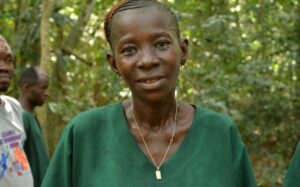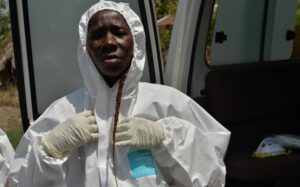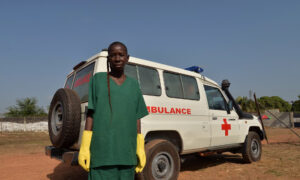According to the World Health Organization (WHO), an epidemic is a disease that spreads during a certain period of time in a specific geographical area and simultaneously affects a large number of people. One of the most severe epidemics of the modern times was the outbreak of the Ebola virus disease (EVD), which struck the people of Africa and sent the world into turmoil in 2014.
One of the most affected countries was Sierra Leone, where an estimated 4,500 or more people died in the last two years. It was a desperate situation. Ever more people presented with symptoms in a country where the already poor healthcare system had collapsed: nurses often lacked gloves to treat patients, hospitals were overcrowded and hundreds of corpses piled up on the streets. A country already ravished by civil war and Genocide a little over a decade ago was now forced to face the onslaught of the Ebola virus.
Outcast and defiant
Until very recently Maseray Kamara lived a quiet life in Bo, the second largest city in Sierra Leone. She resold used clothing for a living while being a devoted mother, wife and grandmother. But her daily life changed dramatically when, in 2014, she learned of a virus that came from neighboring Guinea. Many believed it was witchcraft or false rumors, but the truth was much worse.
After a trip to Freetown, the country’s capital, in November 2014 Maseray presented with strong stomach pains and a fever. She immediately called the hotline to report her symptoms. Her daughter and her sister also felt ill, but refused to go with her because they believed no one escaped the death sentence that is Ebola.
Once in the hospital, the doctors confirmed the worst: the test for the virus came back positive. She spent more than a month in a bed at the Bandajuma Center in Bo, where she was an involuntary witness to situations that made her feel even worse: “I observed that it was only men dressing women who were sick or dead. I also saw how people’s lives were brutally ended by EVD, many more children and women compared to men,” Maseray says. She felt further moved when she saw no one protecting the dignity of deceased women. “I prayed and took an oath to God that if I survived, I would volunteer to do all I could to stop the spread of the disease and thereby to contribute to the reduction in the number of infected people and honor the memory of women,” she adds.
With her thin built Maseray seems fragile, but her iron spirit, invincible faith and selfless actions demonstrate her strength in dealing with the tough reality she had to face. The joy of having survived that she felt when she left the hospital was short lived. She soon learned that Ebola had claimed the lives of many friends and family members, including her husband, her sister and her daughter. Many others turned their backs on her. “At the beginning I was almost a beggar; I had to depend on handouts. This was because after I was discharged, almost everyone I knew before contracting the virus abandoned me. I had no clothes, little food. I was often hungry and slept on bare floors. I was thrown out three times by landlords,” she laments.
One day, Maseray heard about the work of an organization called World Vision. It devoted itself to conducting safe and dignified funerals for Ebola victims. That message was the light at the end of her tunnel: “The reason I joined the team was because I wanted to give back to my community and it was time to fulfill my promise,” recounts the first female Ebola survivor.
In honor of life and tradition
Few people knew that Ebola is transmitted through contact with infected patients and that the virus stays in bodily fluids even after death. In Sierra Leone, it is a tradition to bathe loved ones’ bodies, and this custom is shared by Christians and Muslims. Thus funerals rapidly turned into foci of infection. “Our sacred tradition soon turned into a suicide mission for the families affected,” says Maseray. The State organized teams to collect the bodies, but they often took many days to come. Muslims, who had to bury the bodies before nightfall, were unable to do so, and Christians could not follow their funeral rites. This was a stressful situation for a population that stringently adheres to traditions. Relatives helplessly watched their loved ones ferried away in body bags by the truckload, knowing they would never see them again.
Facing such bleak prospects Maseray, together with the World Vision team, seeks to raise awareness of the risks posed by the virus among the population. In addition, they provide safe and dignified burials, helping to stop the vicious cycle of infection. “Generally, my work is to bag dead bodies/corpses (mostly women) and to carry them to the cemetery for burials. I am also in charge of dressing female corpses, which was one of the biggest problems for communities in reporting female deaths: at first it was men who were doing all burials, which is against some of our traditional practices,” Maseray explains.
She also made a commitment to inform her countrymen of the existence of the virus and the possible preventive measures: “I talk to the families of victims and members of the community about the importance of these safe and dignified burials in the fight against EVD, the need to call the national emergency hotline for both sickness and death alerts. I also share my story with them, emphasizing that Ebola is real and that I am a survivor,” she says. The remarkable and painstaking work Maseray performs has significantly contributed to an increase in the number of alert calls received and to a break in the transmission chain.
Maseray Kamara is a role model and a strong believer in the fact that civil participation in extreme situations makes all the difference. According to her, no one should remain indifferent: “We all have a huge and important role to play in alleviating humanitarian emergencies and must take individual responsibility,” she says.
“Someone in the world”
The first burial this 54-year-old woman from Sierra Leone conducted was particularly painful for her. During a burial ritual for a young woman Maseray could not help but remember her own daughter, who was a nurse and the family’s main breadwinner. She was just another victim of the deadly virus. “A lot of unanswered questions flashed through my mind. I wondered: how was my own daughter buried? Who carried her, where was she buried? These are questions I now accept I will never have answers to. However, I had the opportunity then to do it right for the girl I was burying. So my first burial was tough, but it was fulfilling,” she says.
Maseray feels blessed to be able to contribute to her community and feels like she is “someone in the world.” With great resilience and strength of spirit she was able to beat the virus, and she now continues her fight with gratitude: “After surviving Ebola I thank God and World Vision for their intervention in my life. I am happy to say that my life has changed for the better. I have a house to live in, a bed to sleep on, I eat nutritious food, I dress well and pay school and medical bills for my grandchildren who were orphaned by Ebola,” she says.




